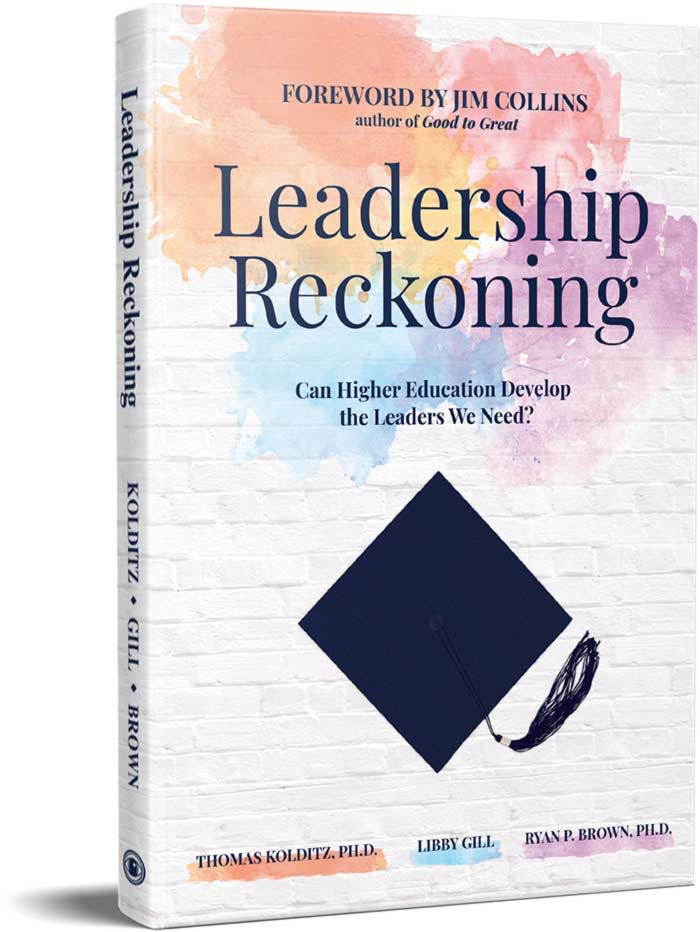Elevating Leadership Development in Higher Education
How Rice University is supporting institutions in their pursuit of developing leaders

It is no secret that colleges and universities, including Rice University, share in the desire to develop the next generation of leaders. Yet, the U.S. is graduating approximately 2.2 million college students each year with high school level leadership abilities — a disappointing reality that can and must change by universities applying the same standards to leader development as they do to other university endeavors.
Working to that end is the Ann and John Doerr Institute for New Leaders at Rice University. The Doerr Institute is helping Rice deliver on its promise to develop tomorrow’s leaders and offering support to other institutions eager to develop the leaders our society needs.
Funded by Rice graduates Ann and John Doerr, well-known venture capitalists, the Doerr Institute is committed to improving the leadership capacity of Rice students and elevating the practice of leadership education and development in higher education. Since 2015, the Doerr Institute has developed more than 2,600 students and currently works with approximately 40% of the Rice student population.
From one-on-one coaching with a professional leadership coach to developmental deep-dives focused on a single leadership competency, all Rice students, undergraduate and graduate, have noncompete access to a plethora of leader development opportunities at no cost. All programs are independently and objectively measured by research psychologists for impact universitywide.
An emphasis on measurement led the Doerr Institute to discover that a college degree does not, in and of itself, make a graduate a more capable leader. In short, unless students engage in intentional leader development, college graduates are joining the workforce with the same capacity to lead as when they left high school.
“Our focus on rigorous measurement is one of the features of the institute that sets it apart from similar initiatives at other universities,” says Ryan Brown, the institute’s managing director for measurement. “This focus allows us to determine which of our programs really develop students and which programs don’t.”

It’s not rocket science. It’s improvement science.
The uniqueness of this element of the Doerr Institute is fueled by reliance on enjoyable yet ineffective “leadertainment” and can be fixed with intellectually honest deployments of development strategies that are evidence-based and confirmed with objective outcome measurement. To help narrow this leadership development gap in higher education, the Doerr Institute has partnered with the Carnegie Foundation for the Advancement of Teaching to create an Elective Classification in Leadership for Public Purpose. This elective classification, currently in the pilot phase, will help validate an institution’s commitment to developing its students as leaders and create an improvement process in the areas of leadership education and development.
Much like other classifications by Carnegie, the Doerr Institute anticipates this elective classification to be a differentiator among schools and provide a unique value proposition for institutions that are able show a serious commitment to leader development.
“The classification will be an opportunity for all higher education institutions to showcase their campus’ definition of leadership, best practices in their context, and significant outcomes in their journey to develop leaders and improve leadership education and development,” says Carla Ortega Santori, the institute’s strategic initiatives manager.
Giving it all away
To support institutions in their pursuit to legitimize their leader development efforts, the Doerr Institute is sharing everything it’s learned at Rice. This includes published and unpublished research, instruments, program specifications, measurement techniques, and a lean and effective business model that is powerfully developmental and about half the cost of classroom instruction.
Much of the Doerr Institute’s findings can be found in “Leadership Reckoning: Can Higher Education Develop the Leaders We Need?” In this new book, the Doerr Institute offers a principle-driven, outcome-oriented blueprint for how effective leader development can occur in higher education, including a transparent and noncompetitive unveiling of what has worked and what hasn’t at Rice. Since publication in January 2021, the Doerr Institute has mailed nearly 2,000 complimentary copies to university stakeholders, including presidents and provosts at the top 200 schools in the U.S.
“Our values are such that sharing is better than competing, and that improving hundreds of institutions is better than keeping what we learn to ourselves," says Tom Kolditz, director of the Doerr Institute. “Our aim is to create more and better leaders, not only at Rice, but also by helping others maximize the effectiveness of their programs, courses and activities.”
Throughout 2020 and 2021, the Doerr Institute has conducted multiple briefings for college boards of trustees and presidents explaining the #LeadershipReckoning movement taking place in higher education. No longer will it be enough for institutions to make a claim in mission statements or mottos that they are developing leaders. University stakeholders like students, parents and donors will be seeking proof of these claims. The new Carnegie elective classification will be one way that colleges and universities can validate their leadership development efforts.
Join the #LeadershipReckoning
Rice University president talks about leader development.
Already, more than 50 institutions have joined the Doerr Institute’s consortium, which is focused on sharing best practices and creating self-assessments that will drive improvement in the areas of leadership education and development.
The elective classification is expected to open for application to colleges and universities in the U.S. in late 2021 or early 2022 and will be administered at Rice in consort with the Carnegie Foundation.
This content is sponsored and written by Rice University. The editorial staff of Inside Higher Ed had no role in its preparation.



